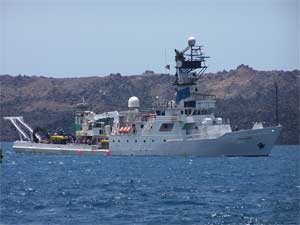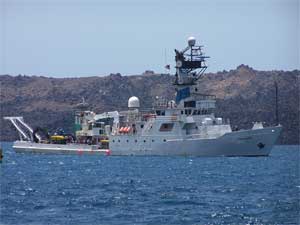 to Brazil, Namibia, Cape Verde to evaluate instrumentation, study ocean circulation, map seafloor
to Brazil, Namibia, Cape Verde to evaluate instrumentation, study ocean circulation, map seafloor
NARRAGANSETT, R.I. – March 16, 2009 – The University of Rhode Island research vessel Endeavor departed from Narragansett today for a four-and-a-half month cruise to Florida, Brazil, Namibia and Cape Verde, the first time she has ever traveled to Africa and one of her very few trips to the South Atlantic.
The 185-foot ship, owned by the National Science Foundation and managed by URI, will be at sea for a total of 194 days in 2009, much of it far from Rhode Island, which presents several operational and logistical challenges.
“It’s going to be a busy year, but we’re ready to get at it,” said Sam DeBow, marine superintendent for the URI Graduate School of Oceanography and a retired rear admiral from the National Oceanic and Atmospheric Administration. “We just completed a three-month maintenance overhaul and a three-day shakedown cruise to exercise our systems, so the vessel is in excellent condition and ready to go.”
After a seven-day transit to the Florida Panhandle, the Endeavor will undertake two research projects over six weeks in the waters off Panama City and Port Everglades, Fla., to evaluate the operations, sensor systems and acoustic communications of autonomous underwater vehicles launched from the ship. These projects are funded by the Office of Naval Research and led by scientists from the Naval Surface Warfare Center.
The Endeavor will then transit to Fortaleza, Brazil, where it will begin a National Science Foundation-funded oceanographic research project to study the circulation of the Atlantic Ocean at the equator to better understand its variability and potential role in year-to-year climate variability. This five-week project, led by URI alumnus William Johns, a professor at the University of Miami, will conclude in Walvis Bay, Namibia in late June.
“This project is part of a larger Tropical Atlantic Climate Experiment, in collaboration with international scientists, that aims to describe the variability of the Atlantic Equatorial Undercurrent in the central and eastern Atlantic Ocean,” said Johns.
From Namibia, the ship will transit to the Cape Verde Islands where a team of scientists will conduct an electromagnetic survey to map the Kane megamullion, a geologic feature on the mid-Atlantic ridge, by towing an instrument array across the sea floor. Funded by the National Science Foundation, this leg of the cruise will be led by Rob Evans of the Woods Hole Oceanographic Institution.
The Endeavor will return to Narragansett on July 30. For the remainder of the year she will undertake three research cruises focusing on physical, chemical and geological oceanographic processes. In addition, URI scientists and local schoolteachers will spend 30 days of ship time in local waters funded by the state through the Rhode Island Endeavor Program.
“The 13 men and women that crew the Endeavor will be spending a great deal of time away from home this year, even longer than usual,” said David Farmer, dean of the Graduate School of Oceanography. “I want to acknowledge their dedication to the ship and its mission, and wish them well as they depart on the first leg of their journey. Without their commitment and expertise, the vital science that will be conducted aboard ship could not be completed.”
Built in 1975, the Endeavor is one of 22 oceanographic research ships coordinated by the University-National Oceanographic Laboratory System, a group of 61 academic institutions and national laboratories involved in oceanographic research and joined for the purpose of coordinating oceanographic ships’ schedules and research facilities. The ship carries a crew of 13 and berthing for up to 17 scientists, and its facilities include four science laboratories, three oceanographic winches and two hydraulic frames to facilitate deployment of scientific equipment.

